7下
七年级下学期期末考试语文试卷(附答案)

七年级下学期期末考试语文试卷(附答案)一、语文积累与运用(30分)1.默写。
(10分).(1)愿为市鞍马,。
(《木兰诗》)(2)不畏浮云遮望眼,。
(王安石《登飞来峰》)(3),则极为神速。
(沈括《活板》)(4),夜泊秦淮近酒家。
(杜牧《泊秦淮》)(5)人们在探讨学问、研究问题时,往往会有这样的情况:山回路转、扑朔迷离,出路难寻。
于是顿生茫茫之感。
但是,如果锲而不舍,继续前行,忽然间眼前出现一线亮光,再往前行,便豁然开朗,发现了一个前所未见的新天地。
这种情境正如陆游在《游山西村》中所写“,”。
(6)刘禹锡的《陋室铭》中作者以古代贤人自况,同时暗示了陋室不陋的句子是“,”。
(7)吊古伤今,很多诗人借此抒发孤独遗世、独立苍茫的落寞情怀,就像唐代的陈子昂中《登幽州台歌》中“,”把这种孤傲高耸的悲情渲染到极致,把个人的无力感放到最大,让人唏嘘。
2. 请运用所积累的知识,完成(1)—(4)题。
(8分)尼摩船长还没有出来,小艇先载了康塞尔和我,把我们送到陆地上去。
地上的土质跟前面一样,是火山形成的。
到处都是火山喷发物,火山岩,玄武岩的遗迹,但我没有看见喷出这些岩石来的火口。
这里跟前面一样,有无数的鸟类给南极大陆这一部分添了生动活泼的气象。
但同时跟我们一齐领有这块土地的,还有一大群海中哺乳类动物,这些动物拿它们的温和眼光盯着我们。
(1)以上文段中的“我”叫,身份是。
(2分)(2)请把文中画线句子改为被动句:(2分)(3)请结合原著回答:①文段中“哺乳动物”指什么?②这些“哺乳动物”为什么“拿它们的温和眼光盯着我们”?(4分)3.某学校开展“杜绝浪费,节俭养德”为主题的综合实践活动,请你参与。
(12分)(1)下面是德育处郭主任在本次活动动员会上的讲话片段,请你根据要求完成题目。
(8 分),历史和现实告诉我们:一个没有勤俭节约、艰苦奋斗精神作支撑的国家是难以【甲】的;一个没有勤俭节约、艰苦奋斗精神作支撑的社会是难以【乙】的;一个没有勤俭节约、艰苦奋斗精神作支撑的民族是难以自立自强的;同样,【丙】一个没有勤俭节约、艰苦奋斗精神作支撑的企业是难以持续进行的。
七下历史思维导图2022
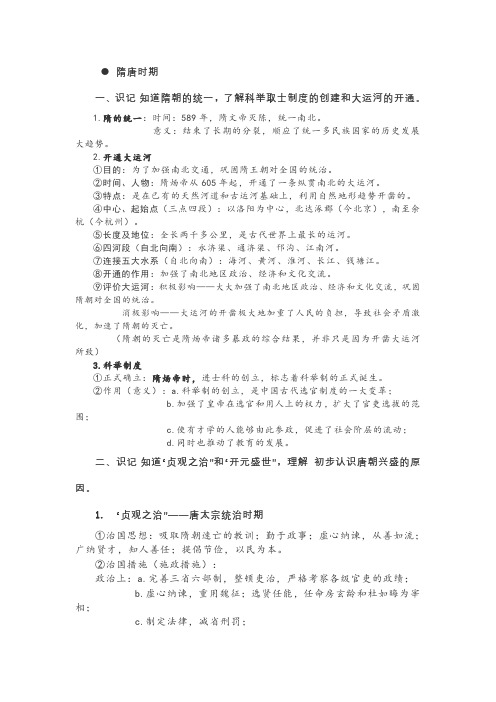
● 隋唐时期一、识记知道隋朝的统一,了解科举取士制度的创建和大运河的开通。
1.隋的统一:时间:589年,隋文帝灭陈,统一南北。
意义:结束了长期的分裂,顺应了统一多民族国家的历史发展大趋势。
2.开通大运河①目的:为了加强南北交通,巩固隋王朝对全国的统治。
②时间、人物:隋炀帝从605年起,开通了一条纵贯南北的大运河。
③特点:是在已有的天然河道和古运河基础上,利用自然地形趋势开凿的。
④中心、起始点(三点四段):以洛阳为中心,北达涿郡(今北京),南至余杭(今杭州)。
⑤长度及地位:全长两千多公里,是古代世界上最长的运河。
⑥四河段(自北向南):永济渠、通济渠、邗沟、江南河。
⑦连接五大水系(自北向南):海河、黄河、淮河、长江、钱塘江。
⑧开通的作用:加强了南北地区政治、经济和文化交流。
⑨评价大运河:积极影响——大大加强了南北地区政治、经济和文化交流,巩固隋朝对全国的统治。
消极影响——大运河的开凿极大地加重了人民的负担,导致社会矛盾激化,加速了隋朝的灭亡。
(隋朝的灭亡是隋炀帝诸多暴政的综合结果,并非只是因为开凿大运河所致)3.科举制度①正式确立:隋炀帝时,进士科的创立,标志着科举制的正式诞生。
②作用(意义):a.科举制的创立,是中国古代选官制度的一大变革;b.加强了皇帝在选官和用人上的权力,扩大了官吏选拔的范围;c.使有才学的人能够由此参政,促进了社会阶层的流动;d.同时也推动了教育的发展。
二、识记知道“贞观之治”和“开元盛世”,理解初步认识唐朝兴盛的原因。
1. “贞观之治”——唐太宗统治时期①治国思想:吸取隋朝速亡的教训;勤于政事;虚心纳谏,从善如流;广纳贤才,知人善任;提倡节俭,以民为本。
②治国措施(施政措施):政治上:a.完善三省六部制,整顿吏治,严格考察各级官吏的政绩;b.虚心纳谏,重用魏征;选贤任能,任命房玄龄和杜如晦为宰相;c.制定法律,减省刑罚;d.完善科举制(增加科举考试科目,鼓励士人报考,进士科逐渐成为最重要的科目)。
人教新目标七年级英语下册--单元必考点过关检测(七年级下Unit 7) 含答案
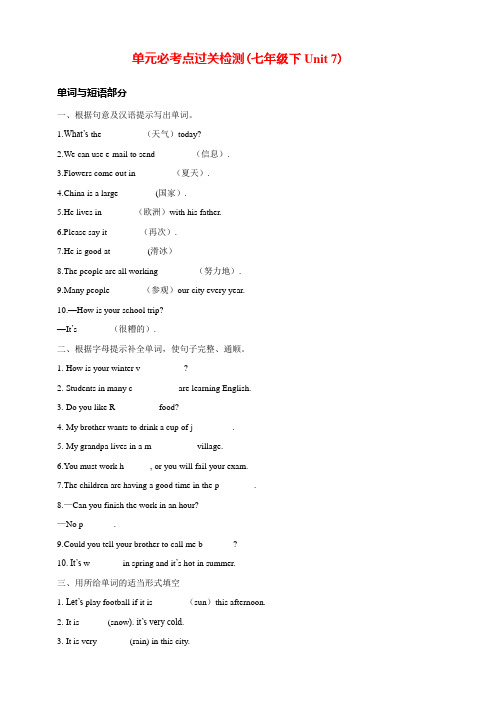
单元必考点过关检测(七年级下Unit 7)单词与短语部分一、根据句意及汉语提示写出单词。
1.What’s the _________(天气)today?2.We can use e-mail to send ________(信息).3.Flowers come out in ________(夏天).4.China is a large ________(国家).5.He lives in _______(欧洲)with his father.6.Please say it _______(再次).7.He is good at ________(滑冰)8.The people are all working ________(努力地).9.Many people _______(参观)our city every year.10.—How is your school trip?—It’s _______(很糟的).二、根据字母提示补全单词,使句子完整、通顺。
1. How is your winter v__________?2. Students in many c__________ are learning English.3. Do you like R__________food?4. My brother wants to drink a cup of j_________.5. My grandpa lives in a m__________ village.6.You must work h______, or you will fail your exam.7.The children are having a good time in the p________.8.—Can you finish the work in an hour?—No p_______.9.Could you tell your brother to call me b_______?10. It’s w_______ in spring and it’s hot in summer.三、用所给单词的适当形式填空1. Let’s play football if it is _______(sun)this afternoon.2. It is ______(snow). it’s very cold.3. It is very _______(rain) in this city.4. Do you like _______(cloud) days?5. It is ______(wind) today. I want to take a bus to school.6.She is a _______(Canada) girl.7.I’m doing some________(cook)8.Friends are buying ________(Russia) bread to take home.9.Is your aunt _______(cook) dinner?10.It’s ________(relax) to listen to music after a day’s work.四、选用方框的动词并用适当形式填空,每个词组只能用一次。
初中七年级下学期期中考试语文试卷(有答案)

初中七年级下学期期中考试语文试卷第Ⅰ卷积累·运用(40分)一、选择题(本大题共6小题,每小题2分,共12分)1. 选出下列加点字的字音完全正确的一组:A. 镌.刻(juān)嫉.妒(jí)矗.立(chù)叱咤.风云(chà)B. 颓.唐(tuí)炫.耀(xuán)摒.弃(bìng)处.决如流(chǔ)C. 参.错(cēn)气氛.(fēn)对称.(chèn)栩栩.如生(xǔ)D. 占卜.(pǔ)颤.动(chàn)殷.勤(yīn)饶.有风味(ráo)2. 下列词语中没有错别字的一项是:A. 遴选抉择时辰相得益章B. 造型篝火恣情芳草如茵C. 感慨山崖斑澜相辅相成D. 坐落恬静懊悔红妆素裹3. 根据语境判断加点词语使用恰当的一项是:A. 溱潼会船的高潮在上午九时,湖面湖岸人山人海,千支竹篙,掀起溱湖水的轩然大...波.,千支鼓槌,敲出惊心动魄的声浪。
B. 强强上课时双手总是不能自已....,一直拿着东西在玩。
C. 故宫和凡尔赛宫都是封建帝王的皇宫,又都耗资巨大,但风格迥异,因此可以说它们是异曲同工....的。
D. 人民商场重新开业后,由于商品种类齐全,各种档次都有,顾客仍像过去一样络绎..不绝..。
4. 下列说法有误的一项是:A. 《破阵子》—辛弃疾—南宋B. 《观刈麦》—白居易—唐代C. 《童年的朋友》—高尔基—苏联D. 《木兰诗》—南朝民歌—《乐府诗集》5. 下列各句中没有语病的一句是:A. 《兰亭序》对后人的影响很大,被视为历代珍品,各朝各代都有人模仿。
B. 我国现行医疗制度、医患关系、病人权利和医疗事故的鉴定仍然有许多亟待改进和完善。
C. 信息技术的发展,使全人类的劳动方式发生了革命性的变化,开创了人类解放的新纪元。
D. 当社会发展到一定历史阶段,某种文字不能满足社会需要的时候,就可能举行文字改革。
人教新目标英语七年级下7-12单元课文翻译
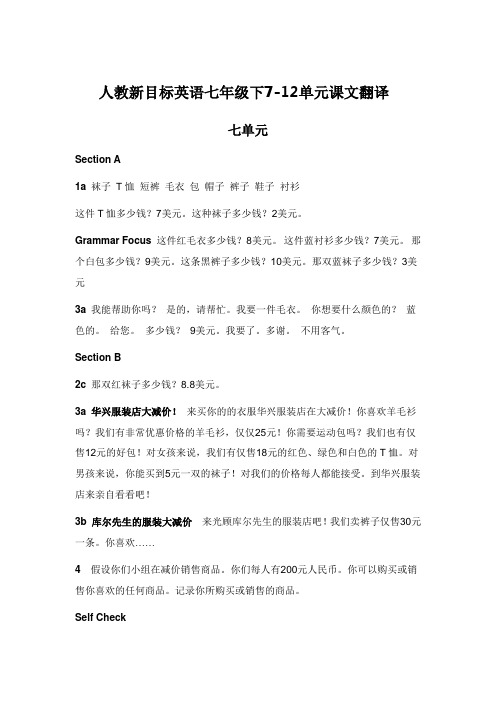
人教新目标英语七年级下7-12单元课文翻译七单元Section A1a袜子T恤短裤毛衣包帽子裤子鞋子衬衫这件T恤多少钱?7美元。
这种袜子多少钱?2美元。
Grammar Focus这件红毛衣多少钱?8美元。
这件蓝衬衫多少钱?7美元。
那个白包多少钱?9美元。
这条黑裤子多少钱?10美元。
那双蓝袜子多少钱?3美元3a我能帮助你吗?是的,请帮忙。
我要一件毛衣。
你想要什么颜色的?蓝色的。
给您。
多少钱?9美元。
我要了。
多谢。
不用客气。
Section B2c那双红袜子多少钱?8.8美元。
3a华兴服装店大减价!来买你的的衣服华兴服装店在大减价!你喜欢羊毛衫吗?我们有非常优惠价格的羊毛衫,仅仅25元!你需要运动包吗?我们也有仅售12元的好包!对女孩来说,我们有仅售18元的红色、绿色和白色的T恤。
对男孩来说,你能买到5元一双的袜子!对我们的价格每人都能接受。
到华兴服装店来亲自看看吧!3b库尔先生的服装大减价来光顾库尔先生的服装店吧!我们卖裤子仅售30元一条。
你喜欢……4 假设你们小组在减价销售商品。
你们每人有200元人民币。
你可以购买或销售你喜欢的任何商品。
记录你所购买或销售的商品。
Self Check1 包短袜短裤毛衣T恤裤子黑色的蓝色的绿色的红色的白色的多少11 —— 313 Zig Zag’s 服装店嗨,男孩子们,女孩子们。
看看ZIG的服装店吧。
黑色和蓝色帽子每顶15美元。
蓝色毛衣31美元,红色毛衣30美元,黄色短裤也是30美元。
绿色短裤减价了,每条25美元!这些鞋多少钱一双?对不起,那些是我的鞋子,我需要他们!Just for Fun短裤多少钱?18美元。
这件毛衣多少钱?31美元。
这双袜子多少钱?3美元。
我要买这双袜子!八单元Section A1a 月份一月——十二月维拉,你的生日是什么时候?我的生日是10月10日。
杰夫,你的生日是什么时候?我的生日是6月4日。
玛丽,你的生日是什么时候?我的生日是1月15日。
部编语文七下生字词拼音[优质ppt]
![部编语文七下生字词拼音[优质ppt]](https://img.taocdn.com/s3/m/18a7c5a871fe910ef12df8ff.png)
第12课
1.给下面加点的字注音。
自矜.( jīn ) 家圃.( pǔ )
矢.( shǐ )
颔.(hàn )
酌.(zhuó ) 杓.( sháo )
遣.(qiǎn )
睨.( nì ) 忿.然(fèn) 沥.(lì )
第四单元
第13课
1.朗读课文,给红色生字词注音。
草率( shu)ài 生疏(
)
恳切 ( z)huó 譬如(
翳.(yì ) 滞.笨(zhì) 愧怍.( zuò)
1.阅读课文,第圈1点1课文中的生字词。 啃.( kěn) 蹦.(bèng ) 撬.(qiào ) 磕(kē) 揩.( kāi ) 嘎.( gá ) 黏.( ni)án 尴.尬.(gān gà) 门槛.( kǎn ) 糟.糕(zāo) 醒悟.( wù ) 晌.午(shǎn)g 烦躁.(zào) 头颅.( lú ) 涎.水( xián) 筹.划( chóu)
)
累赘(
k)ěn 拖沓(
)
诲人不倦 ( lóng) 不耻下问 (
鞠躬尽瘁 ( zhuì
)
颠沛流离 ( tuǒ tiē
)
huì juàn
商酌 ( sh)ū
朦胧 (
)
妥帖 ( pì rú )
)
tà
chǐ
jū gōng jìn cuì diān pèi liú lí
第14课
1.朗读课文,圈画文中生字词。 (1)给下列加点字注音。
注音:
契约( qì) 揽(lǎn) 悲天悯人(mǐn )
1.朗读课文,给红色生字词注音。
第16课
德馨( xīn ) 鸿儒(rú ) 西蜀( dú
苔痕( hén) 案牍( shǔ )
(人教版)初中英语七下 Unit 7单元测试03(含答案)
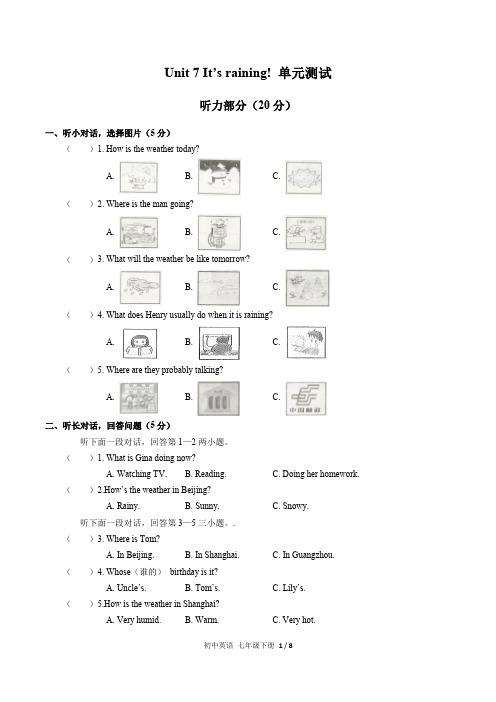
Unit 7 It’s raining! 单元测试听力部分(20分)一、听小对话,选择图片(5分)()1. How is the weather today?A. B. C.()2. Where is the man going?A. B. C.()3. What will the weather be like tomorrow?A. B. C.()4. What does Henry usually do when it is raining?A. B. C.()5. Where are they probably talking?A. B. C.二、听长对话,回答问题(5分)听下面一段对话,回答第1—2两小题。
()1. What is Gina doing now?A. Watching TV.B. Reading.C. Doing her homework.()2.How’s the weather in Beijing?A. Rainy.B. Sunny.C. Snowy.听下面一段对话,回答第3—5三小题。
.()3. Where is Tom?A. In Beijing.B. In Shanghai.C. In Guangzhou.()4. Whose(谁的)birthday is it?A. Uncle’s.B. Tom’s.C. Lily’s.()5.How is the weather in Shanghai?A. Very humid.B. Warm.C. Very hot.三、听短文,选择正确答案(10分)()1. What is Jean?A. A reporter.B. A teacher.C. An actress.()2. What is Wang Yang doing?A. Playing the guitar.B. Swimming.C. Having dinner.()3. What’s the weather like in Hainan?A. Cloudy.B. Sunny.C. Windy.()4. What are people wearing in Heilongjiang?A. T-shirts.B. Thin sweaters.C. Coats.()5. How is the weather in Shanghai when it is snowy in Heilongjiang?A. Nice.B. Hot and humid.C. Snowy.笔试部分(80分)四、完形填空(10分)When you go to England, you can be 1 many people take an umbrella(伞)or a raincoat(雨衣)2 them in the sunny morning.On a bus or a train, you can usually see 3 is looking out of the window or reading newspapers. But they don’t talk much. When you meet English people, they often talk about one thing —the 4 .5 is it so? Because the weather is changeable(多变的)in England. People there can have spring,summer, autumn and 6 in one day. When they get on the bus, the weather is sunny and7 just like in spring. However, when they get out of the bus, it can be 8 and cold. At noon, theweather will be sunny and a little hot and it will be summer at this time of a day.In England, people can also have summer in winter, or have winter in summer. So in 9 they can swim sometimes and in summer sometimes you can see people 10 warm clothes.()1. A. surprised B. surprising C. bored D. boring()2. A. on B. to C. with D. for()3. A. many people B. everyoneC. all the peopleD. some of the people()4. A. book B. newspaper C. window D. weather()5. A. Why B. Where C. How D. What()6. A. Sunday B. winter C. rain D. snow()7. A. cold B. cool C. hot D. warm()8. A. sunny B. snowy C. windy D. humid()9. A. spring B. summer C. autumn D. winter()10. A. sell B. selling C taking D. takes五、阅读理解(30分)A()1. On _________ it is windy all day(整天).A. MondayB. WednesdayC. ThursdayD. Saturday()2. What can you do on Friday?A. Run in the park.B. Swim in the pool.C. Make a snowman.D. Ride a bike.()3. What season(季节)is it?A. Summer.B. Spring.C. Winter.D. Autumn.BHello, everyone! Thank you for joining Around China show.Today, we’re in Dalian. It’s really a beautiful city. I like it very much. The people here are very friendly.The weather here is sunny and warm. There are lots of people on vacation here. Now we’re on the beach (海滩). Some are taking photos and some are swimming. Some young people are playing volleyball. They are having a good time.Look! There is a girl by the sea. She’s drawing there. Many people are watching her. There are also two musicians by the sea. One is playing the guitar and the other is singing. They look so cool!Dalian is really a very interesting city. The people are really very relaxed(轻松自在的)here! Come and enjoy yourself!()4. How’s the weather in Dalian?A. Sunny but cold.B. Sunny and warm.C. Cloudy and cold.D. Sunny and windy.()5. What are some young people doing?A. They’re taking photos.B. They’re swimming.C. They’re dancing.D. They’re playing volleyball.()6. Who’s drawing by the sea?A. A girl.B. A boy.C. An old woman.D. A young man.()7. The writer thinks Dalian is a(n)_________ city.A. cleanB. noisyC. interestingD. scaryCNew Energy in the Twenty-first CenturyEnergy from windWind is a kind of clean energy, and there is lots of it, but, if there’s no wind, there is no wind energy.Energy from the waterWhen water from a high place to a lower place, it can make electricity(电)without pollution. However, people have to build dams(水坝)to use this energy, and building dams is very expensive.Energy from the earthThere is heat in the rocks under the earth. Scientists use the beat to make geothermal(地热的)energy. This kind of energy is cheap and clean, but it is only possible in a few places in the world.Energy from the sunSolar panels(太阳电池板)on the roofs of house can tum energy from the sun into electricity. Solar power is clean and plentiful(丰富的). When the weather is bad, it doesn’t work.()8. What kind of energy is very expensive if we want to get it?A. Energy from wind.B. Energy from the water.C. Energy from the earth.D. Energy from the sun.()9. What kinds of energy depend much on the weather according to the passage?A. Energy from the water and energy from the wind.B. Energy from the water and energy from the earth.C. Energy from the earth and energy from the sun.D. Energy from the wind and energy from the sun.()10. These kinds of energy have something in common —they’re _________.A. expensiveB. cleanC. easy to getD. difficult to get()11. According to the passage,we can know all these kinds of energy _________.A. have advantages(优势)and disadvantages(不足)B. are widely used in ChinaC. are widely used in AmericaD. are widely used in the worldDFour students from different(不同的)countries are camping(野营)and they are talking about the weather. Let’s listen to them!Tiffany: It’s cool and sunny most of the time in our country. I live in Beijing, a beautiful city(城市). It’s summer now. It is a little hot, but I still feel good.Lolita: I live in Moscow. It’s usually windy there.It makes me feel bad. I don’t like that.Ben: I live in the north(北方)of Canada. It’s very cold in winter, so we wear warm clothes. Many people like snowy weather because they can make snowmen and Canada is beautiful then.Jeff: I come from Australia. I never see a snowy day. It’s very hot most of the time in our country. And in winter it’s not very cold. Many people like to come to my country for their vacation.()12. It can be _________ in Beijing now.A. MarchB. JulyC. DecemberD. February()13. _________ doesn’t like the weather of his/her country.A. JeffB. LolitaC. TiffanyD. Ben()14. Jeff never sees a _________ day in Australia.A. snowyB. rainyC. windyD. cloudy()15. We can learn that _________.A. Tiffany comes from AustraliaB. it’s usually warm in MoscowC. Ben lives in the south of CanadaD. many people like to go to Jeff’s country for their vacation六、词汇运用(15分)A.用方框中所给单词的适当形式填空,每词仅用一次(每空一词)。
人教版7年级下unit9知识点全解
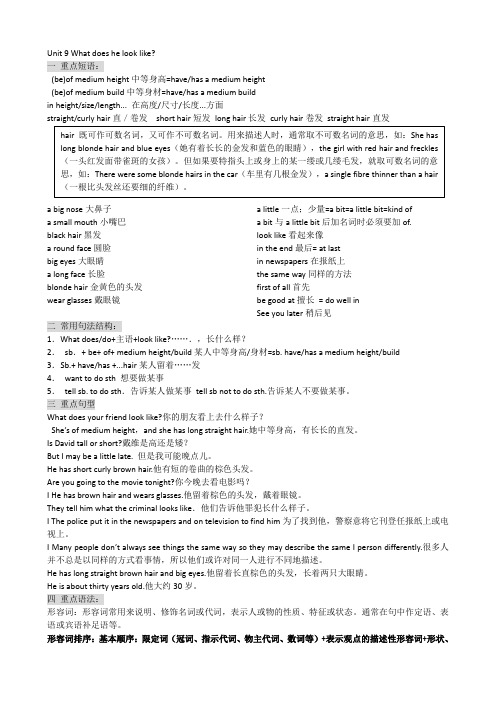
Unit 9 What does he look like?一重点短语:(be)of medium height中等身高=have/has a medium height (be)of medium build中等身材=have/has a medium build in height/size/length... 在高度/尺寸/长度...方面a big nose大鼻子a small mouth小嘴巴black hair黑发a round face圆脸big eyes大眼睛a long face长脸blonde hair金黄色的头发wear glasses戴眼镜a little一点;少量=a bit=a little bit=kind of a bit与a little bit后加名词时必须要加of. look like看起来像in the end最后= at lastin newspapers在报纸上the same way同样的方法first of all首先be good at擅长= do well inSee you later稍后见二常用句法结构:1.What does/do+主语+look like?…….,长什么样?2.sb.+ be+ of+ medium height/build某人中等身高/身材=sb. have/has a medium height/build3.Sb.+ have/has +...hair某人留着……发4.want to do sth 想要做某事5.tell sb. to do sth.告诉某人做某事tell sb not to do sth.告诉某人不要做某事。
三重点句型What does your friend look like?你的朋友看上去什么样子?She’s of medium height,and she has long straight hair.她中等身高,有长长的直发。
七下英语单词

七年级下册英语单词(全)Unit12camp v.扎营;扎帐篷lake n.湖,湖泊beach n.海滩,沙滩badminton n.羽毛球运动sheep n.羊,绵羊as adv.&pron 作为,当做natural pron 自然的butterfly n.蝴蝶visitor n.游客;访问者tired adj.疲倦的stayv.停留stay up late 深夜不留awayadv.离开run away 跑开mouse n.老鼠baby n.幼小的shout v.呼叫,喊叫shout at…冲……大声叫嚷woof interg.(狗叫声)汪汪language n.语言fly v.飞kite n.风筝fly a kite 放风筝high adj.&adv 高的(地)high school 中学ago adv.以前India n.印度tent n.帐篷put up 搭起,举起moon n.月亮surprise n.&v.惊奇,惊讶get a surprise 吃惊snake n.蛇scared adj.惊慌的move v.移动shout to…对……大声喊叫start v.开始,着手jump v.跳跃up and down 上上下下wake v.弄醒,醒into prep.到……里面forest n.森林ear n.耳朵Lucy 露西(女名)Unit11milkv.挤奶cown.奶牛milk a cow 给奶牛挤奶horse n.马ride a horse 骑马feed v.喂养;饲养feed chickens 喂鸡farmer n.农民;农场主quite adv.相当;安全quite a lot(of…) 许多anything pron. (常用于否定句或疑问句)任何东西;任何事物grow v.种植;生长;发育farmn.农场;务农;种田pick v.采;摘excellentadj.极好的;优秀的countrysiden.乡村;农村in the countryside 在乡下;在农村yesterday n.昨天flower n.花worry v.担心;担忧luckily adv.幸运地;好运地sun n.太阳museum n.博物馆fire n.火灾fire station 消防站painting n.油画;绘画exciting adj.使人兴奋的;令人激动的lovely adj.可爱的expensive adj.昂贵的cheapadj.廉价的;便宜的slow adj.缓慢的;迟缓的fast adv&adj 快地(的)robot n.机器人guide n.导游;向导gift n.礼物;赠品all in all 总的说来everything pron 一切;所有事物interested adj.感兴趣的be interested in 对……感兴趣dark adj.黑暗的;昏暗的hear(heard)v.听到;听见Carol 卡罗尔(女名)Unit10noodle n.面条mutton n.羊肉beef n.牛肉cabbage n.卷心菜;洋白菜potato n.土豆;马铃薯special n.特色菜;特价品;特别的;特殊的would v.(表示意愿)愿意would like 愿意;喜欢yetadv(常用于否定句或疑问句)还;仍然large adj.大号的;大的order n.&v.点菜;命令take one's order点菜sizen.大小;尺码bowl n.碗one(large)bowl of 一(大)碗tofun 豆腐meat n.(可食用的)肉dumpling n.饺子porridge n.粥;面糊onion n.洋葱fishn.鱼;鱼肉pancake n.烙饼;薄饼world n.世界around the world 世界各地answer n.答案v.回答different adj.不同的cake n.蛋糕candle n.蜡烛age n.年龄make a wish 许愿blowv.吹blow out 吹灭if conj.如果will v.会the UK n.英国candy n.糖果lucky adj.幸运的popular 受欢迎的;普遍的get popular 受欢迎;流行cut up 切碎idea n.想法;主意bring good luck to…给……带来好运Unit9curly adj.卷曲的straight adj.直的tall adj.高的medium adj. 中等的height n.身高;高度of medium height 中等身高thin adj.瘦的heavy adj.重的build n.身材of medium build 中等身材tonight adv.&n.今夜little adj.小的a little 一点,少量cinema n.电影院glasses n.眼镜later adj.以后handsome adj.英俊的actor n.演员actress n.女演员person n.人nose n.鼻子blonde adj.金黄色的mouth n.嘴round adj.圆形的face n.脸eye n.眼睛singer n.歌手artist n.艺术家crime n.犯罪活动criminal n.罪犯put v.放each adj.&pron.每个,各自way n.方式,路线describe v.描述differently adv.不同地another adj.&pron 另一,又一end n.结尾,尽头in the end 最后real adj..真正的;真实的jeans n.牛仔裤Johnny 约翰尼(男名)Dean 迪安(姓)Tina 蒂娜(女名)Jackson 杰克逊(姓)Unit8post n.邮政office n. 办公室post office 邮局police n.警察police station 警察局hotel n.旅店;酒店restaurant n.餐馆bank n.银行hospital n.医院street n.大街pay v.付费pay phone 付费电话near prep.在……附近across adv.过;穿过across from 在……对面front n.前面in front of 在……前面behind prep.在……后面town n.镇;市镇around adv.&prep.到处;大约north n.北;北方adj.北方的along prep.沿着go along 沿着(这条街)走turn v.转向;翻right adv.向右边;n.右边left adv.向左边n.左边turn right |/left 向右、左转crossingn.十字路口neighborhood n.街区;街坊spend v.花(时间、钱等)spend time 花时间climb v.爬road n.路often adv.时常;常常air n.空气sunshine n.阳光free adj 免费的enjoyv.享受;喜爱enjoy reading 喜欢阅读easily adv.容易地money n.钱Unit7rain v.下雨n.雨水windy adj.多风的cloudy adj 多云的sunny adj 晴朗的snow v.下雪;雪weather n.天气cook v.做饭bad adj 坏的;糟的park n.公园message n.信息;消息take a message 捎个口信;传话him pron.他(he 的宾格)could v.能;可以back adj.回来;回原处call(sb)back 回电话problem n.困难;难题again adj.再一次;又一次dry adj.干燥的cold adj 寒冷的;冷的hot adj 热的warm adj 温暖的visit v.拜访;参观Canada n.加拿大summer n.夏天;夏季sit v.坐juice n.果汁;饮料soon adv.不久;很快vacation n.假期on(a)vacation 度假hard adv.努力地;困难的Europe n.欧洲mountain n.高山country n.国;国家skate v.滑冰snowy adj.下雪的winter n.冬天;冬季Russian adj.俄罗斯的;俄罗斯人;俄语snowman n.雪人rainy adj.阴雨的;多雨的Joe 乔(男名)Jeff 杰夫(男名)Moscow 莫斯科Toronto多伦多Boston 波士顿Unit6newspaper n .报纸read a newspaper 看报纸use v.使用;运用Soup n.汤make soup 做汤wash v.洗movie n.电影go to movies 看电影just adv .只是;恰好eat out 出去吃饭house n.房子drink v..喝n.饮料tea n.茶;茶叶drink tea 喝茶tomorrow adv 在明天n.明天;未来pool n.游泳池;水池shop v. 购物n.商店supermarket n. 超市man n 男人;人racen.竞赛host n.主人;东道主study v. n 学习;研究state n 洲the United States 美国;美利坚合众国American adj 美国的;美洲的n 美国人;美洲人dragon n.龙Dragon Boat Festival 端午节any adj.任何的.任一的pron.任何;任一other adj 另外的;其他的pron.另外的人(或物)young adj 幼小的,年轻的children n 儿童miss v.怀念. 思念wish v 希望delicious .adj 可口的.美味的still .adv. 还.仍然living room 客厅Steve 史蒂夫(男名)Laura 劳拉(女名)Unit5panda n. 熊猫zoo n.动物园tiger n.老虎elephant n.大象koala n. 树袋熊lion n.狮子giraffe n. 长颈鹿animal n .动物cute adj.可爱的;机灵的lazy adj.懒散的;懒惰的smart adj 聪明的beautiful adj 美丽的;美好的scary adj 吓人的;恐怖的kind n 种类kind of 稍微;有点儿Australia n. 澳大利亚south adj 南方的n 南;南方Africa n.非洲South Africa 南非pet n. 宠物leg n. 腿cat n. 猫sleep n 睡觉friendly adj .友好的shyadj. 羞怯的;腼腆的save v .救;救助symbol n.象征flag n. 旗;旗帜forget v.忘记;遗忘get lost 迷路place n .地点;位置watern.水danger n. 危险be in (great) danger 处于(极大)危险之中cut v .砍;切down adv. (坐、躺、倒)下prep.向下;沿着cut down 砍倒tree n. 树kill v.杀死;弄死ivory n.象牙over prep . 超过;多于;在…上方(be) made of 由……制成的Julie 朱莉(女名)Becky 贝姬(女名)Thailand n.泰国Thai n.泰国(人的);泰语(的) Unit4rule n.规则;规章arrive v.到达(be) on time 准时hallway n.走廊;过道hall n.大厅;礼堂dining hall 餐厅listen v.听;倾听listen to…听……fight v. &n.打架;战斗sorry adj.抱歉的;难过的;惋惜的outside adv 在外面adj 外面的wear v.穿;戴important adj.重要的bring v.带来;取来uniform n.校服;制服quiet adj 安静的out adv.外出go out 外出(娱乐)practice v.& n.练习dish n.碟;盘do the dishes 清洗餐具before prep. conj 在…以前adv以前make (one’s) bed 铺床dirty adj.脏的kitchenn.厨房more adj. pron.更多的noisy adj.吵闹的relax v.放松;休息read v.读;阅读terrible adj.非常讨厌的;可怕的feel v.感受;觉的strict adj.严格的;严厉的be strict (with sb) (对某人)要求严格remember v.记住;记起follow v.遵循;跟随follow the rules 遵守规则luck n.幸运;运气keep v.保持;保留hair n.头发;毛发learn v. 学习;学会Clark 克拉克(姓;男名)Amy埃米(女名)Molly 莫莉(女名)New York 纽约Unit3train n.火车bus n.公交车subway n.地铁take the subway 乘地铁ride v 骑n 旅行bike n.自行车a ride a bike 骑自行车sixty num.六十seventy num.七十eighty num.八十ninety num.九十hundred num.一百minute n.分钟far adv.&adj 远;远的kilometern.公里new adj.新的;刚出现的every adj.每一;每个every day 每天by prep.(表示方式)乘(交通工具)by bike 骑自行车drive v.开车car n.小汽车;轿车livev.居住;生活stop n.车站;停止think of 认为cross v.横过;越过river n.河;江manyadj.&pron.许多village n.村庄;村镇between prep.介于…之间between…and…在……和……之间bridge n.桥boat n.小船Ropeway n.索道year n.年;岁afraid adj.害怕;惧怕like prep.像;怎么样leave v.离开dream n.梦想;睡梦v.做梦true adj.真的;符合事实的come true 实现;成为现实Dave 戴夫(男名)Unit2up adv 向上get up 起床;站起dress v.穿衣服n.连衣裙get dressed 穿上衣服brush v.刷刷净n.刷子tooth n.(pl. teeth)牙齿shower n.v 淋浴;淋浴器(间)take a shower 洗淋浴usually adv.通常地;一般地forty num.四十Wow intery.(表示惊奇或敬佩)哇;呀never adv 从不;绝不early adv. adj 早(的)fifty num.五十job n.工作;职业work n.& v.工作station n.电视台;车站radio station广播电台o'clock adv.(表示整点)…点钟night n.晚上;夜晚funny adj 奇怪的;滑稽好笑的exercise v.n 锻炼;练习on weekends. (在)周末best adj.& adv.最好的(地)half n.一半,半数past prep.晚于;过(时间)adj.过去的quartern.一刻钟;四分之一homework n.家庭作业do (one’s) homework 做作业run v 跑;奔clean v 打扫;弄干净;adj 干净的walk n.&v.行走;步行take a walk 散步走一走quickly adv 很快地either adv 或者;也(用在否定词组后)Either…or ……要么……要么……;或者……或者……lot pron. 大量;许多lots of 大量;许多sometimes adv.有时taste v.有…的味道;品尝n.味道;滋味Life n.生活,生命Rick 里克(男名)Jim 吉姆(男名)Scott 斯科特(男名)Tony 托尼(男名)Unit 1guitar n.吉他sing v.唱;唱歌swim v.游泳dance v.跳舞;舞蹈draw v.画chess n.国际象棋play chess 下国际象棋speak v.说;说话speak English 说英语join v.参加;加入club n.俱乐部;社团be good at…擅长于……tell v. n 讲述;告诉story n 故事;小说write v.写作,写字show n.演出;表演v.展示;or conj.或者talk v. n 说话;谈话talk to …跟……说kungfu n.(中国)功夫drum n.鼓play the drums 敲鼓piano n.钢琴play the piano 弹钢琴violin n.小提琴play the violin 拉小提琴also adv 也;而且people n 人;人们home n 家,活动本部.adv 到家;在家be good with…善于应付……的;对……有办法make v.使成为;制造make friends 结交朋友today adv.在今天help (sb) with sth. 在某方面帮助(某人)center n(=centre)中心,中央weekend. n.周末on the weekend. (在)周末teach v 教,讲授musician n.音乐家Lisa 莉萨(女名)Jill 吉尔(女名)Peter 彼得(男名)。
部编版七年级下全册成语运用选择题

耻。这个成语与此处“向老师提问”的语境不符,故选 B。
15、下列句中加点成语使用不当的一项是(
)
A、 推进生态文明建设,每一位公民都不能袖手.旁.观..。 B、有点游客明明看到景点有“禁止拍照”的提示,还是义无反.顾...地拍照留影。 C、中国人民对战争带来的苦难有着刻骨.铭.心..的记忆,对和平有着不懈的追求。 D、人生路上有时山高难攀,我们只能锲而.不.舍..,才能登上理想之巅。 15、B、 【解析】 “义无反顾”意为从道义上只有勇往无前,不能犹豫回顾。褒
D.为了筹建南极长城站,他呕心.沥.血..;长城站落成时,这位钢铁般的汉子也流 泪了。
10.A【解析】深居简出,原指野兽藏在深密的地方, 很少出现。后指平日在家里,
很少出门。不符合语境。
11.请选出下列句子中加点词语运用有误的一句(
)
A.父亲又像是对我,又像是自言.自.语..地感叹。 B.他在选择高考志愿的第一志愿学校时,既想报清华大学,又想报北京大学,
C.古有替父从军,今有背母求学,孝顺的美德重蹈.覆.辙..,引发了人们对传统美 德更深层的思考。
D.虽然这个特大传销集团的案情扑朔.迷.离..,但警察明察秋毫,终将传销团伙一 网打尽。
6.C【解析】“重蹈覆辙”指再走翻过车的老路,比喻不吸取失败的教训,重犯
过去的错误。用在这里不合语境。
7.下列句子中画线的词语使用有误的一项是(
7.D【解析】解析:本题考查词语的理解与运用。“扑朔迷离”形容事物错综复
杂,难于辨别。 D项的意思是天空中的云彩变化多端,难以揣测,应该用“变幻
莫测”。
第三单元
8.下列句中加点词语使用不恰当的一项是 ( )
A.父亲老实厚道低.眉.顺.眼.累了一辈子,没人说过他有地位,父亲也从没觉得自 己有地位。
七年级下学期必背句子(Units1-6)

七年级下学期必背句子(Units1-6)Unit 11. —Where are you from? —I’m from Jingzhou. —你来自哪里?—我来自荆州2. —Where is Sydney? —It’s in Australia. —悉尼在哪里?—它在澳大利亚。
3. Where is your pen pal from?/Where does your pen pal come from? 你的笔友来在哪里?4 —Where does he live? —He lives in Paris. —他住在哪里。
—他住在巴黎5 —What language does he speak? —He speaks English. —他讲什么语言。
—他讲英语。
6. I like going to the movies and playing sports. 我喜欢看电影和做运动。
7. Please write and tell me about yourself. 请写信告诉关于你自己的情况。
8. I want a pen pal in China.我想要一个在中国的笔友。
9. I can speak English and a little French.我会讲英语和一点法语。
10. Can you write to me soon?你能尽快(不久)给我写信吗?Unit 21. —Is there a bank near here/in the neighborhood? —这附近有一家银行吗?—Yes, there is /No, there isn’t.—是的,有/不,没有。
2. The pay phone is across from the bank. 电话亭在银行的对面。
3. The pay phone is next to the bank. 电话亭在银行的旁边。
4. The pay phone is between the restaurant and the post office.电话亭在餐馆和邮局之间5 —Who sits in front of you? —Tom does —谁坐在你的前面?—Tom6. —Who sits behind you? —Jim does. —谁坐在你的后面?—Jim7. There are some books on the desk. 有一些书在桌子上8. There aren’t any books on the desk. 没有一些书在桌子上。
部编版7年级下语文课时练《第6课 老山界》(含答案)
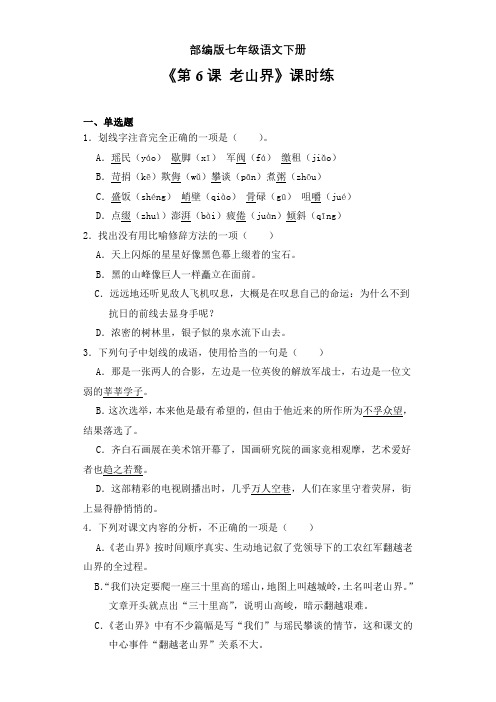
部编版七年级语文下册《第6课老山界》课时练一、单选题1.划线字注音完全正确的一项是()。
A.瑶民(yáo)歇脚(xī)军阀(fá)缴租(jiǎo)B.苛捐(kē)欺侮(wǔ)攀谈(pān)煮粥(zhōu)C.盛饭(shéng)峭壁(qiào)骨碌(gū)咀嚼(jué)D.点缀(zhuì)澎湃(bài)疲倦(juàn)倾斜(qīng)2.找出没有用比喻修辞方法的一项()A.天上闪烁的星星好像黑色幕上缀着的宝石。
B.黑的山峰像巨人一样矗立在面前。
C.远远地还听见敌人飞机叹息,大概是在叹息自己的命运:为什么不到抗日的前线去显身手呢?D.浓密的树林里,银子似的泉水流下山去。
3.下列句子中划线的成语,使用恰当的一句是()A.那是一张两人的合影,左边是一位英俊的解放军战士,右边是一位文弱的莘莘学子。
B.这次选举,本来他是最有希望的,但由于他近来的所作所为不孚众望,结果落选了。
C.齐白石画展在美术馆开幕了,国画研究院的画家竞相观摩,艺术爱好者也趋之若鹜。
D.这部精彩的电视剧播出时,几乎万人空巷,人们在家里守着荧屏,街上显得静悄悄的。
4.下列对课文内容的分析,不正确的一项是()A.《老山界》按时间顺序真实、生动地记叙了党领导下的工农红军翻越老山界的全过程。
B.“我们决定要爬一座三十里高的瑶山,地图上叫越城岭,土名叫老山界。
”文章开头就点出“三十里高”,说明山高峻,暗示翻越艰难。
C.《老山界》中有不少篇幅是写“我们”与瑶民攀谈的情节,这和课文的中心事件“翻越老山界”关系不大。
D.“远远地还听见敌人飞机的叹息,大概是在叹息自己的命运:为什么不到抗日的战线上去显显身手呢?”这句话既点出了红军长征、北上抗日的背景,也含蓄地表明国民党军队里的一些官兵不愿意内战、希望抗日的心愿。
二、填空题5.找出下列词语中的错别字,并改正。
军阀道谦惊惶酣然入梦刺入饥骨篱笆疲倦苯重悬涯峭壁苛捐杂税6.根据拼音写汉字。
语文基础知识点归纳初一下册
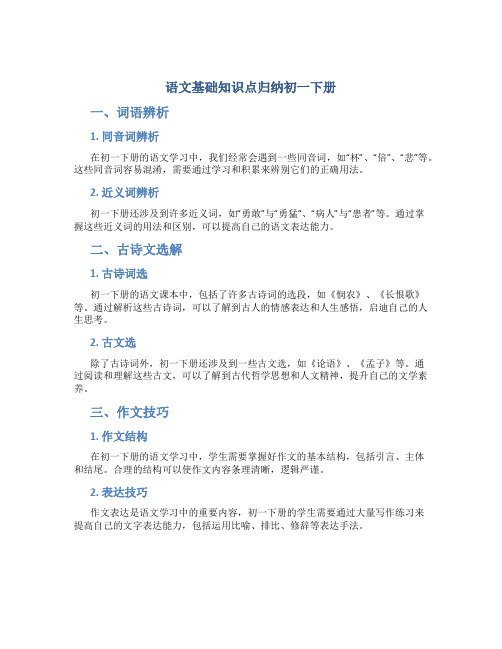
语文基础知识点归纳初一下册一、词语辨析1. 同音词辨析在初一下册的语文学习中,我们经常会遇到一些同音词,如“杯”、“倍”、“悲”等。
这些同音词容易混淆,需要通过学习和积累来辨别它们的正确用法。
2. 近义词辨析初一下册还涉及到许多近义词,如“勇敢”与“勇猛”、“病人”与“患者”等。
通过掌握这些近义词的用法和区别,可以提高自己的语文表达能力。
二、古诗文选解1. 古诗词选初一下册的语文课本中,包括了许多古诗词的选段,如《悯农》、《长恨歌》等。
通过解析这些古诗词,可以了解到古人的情感表达和人生感悟,启迪自己的人生思考。
2. 古文选除了古诗词外,初一下册还涉及到一些古文选,如《论语》、《孟子》等。
通过阅读和理解这些古文,可以了解到古代哲学思想和人文精神,提升自己的文学素养。
三、作文技巧1. 作文结构在初一下册的语文学习中,学生需要掌握好作文的基本结构,包括引言、主体和结尾。
合理的结构可以使作文内容条理清晰,逻辑严谨。
2. 表达技巧作文表达是语文学习中的重要内容,初一下册的学生需要通过大量写作练习来提高自己的文字表达能力,包括运用比喻、排比、修辞等表达手法。
四、阅读理解初一下册的语文教材中,包含了丰富多样的文学作品和文言文篇章,学生需要通过阅读理解来理解文本内容,把握主题思想,提高文学鉴赏能力。
五、诗词鉴赏初一下册还包括了一些古诗词的鉴赏内容,学生需要通过学习和分析来理解古诗词的意境和表达技巧,培养自己的审美情趣。
结语通过初一下册的语文学习,学生可以系统地积累语文基础知识点,提高自己的阅读理解能力和写作水平,为以后的学习打下坚实基础。
希望同学们能在语文学习中不断进步,发现语文之美,享受语文之乐。
鲁教版7年级下英语课文
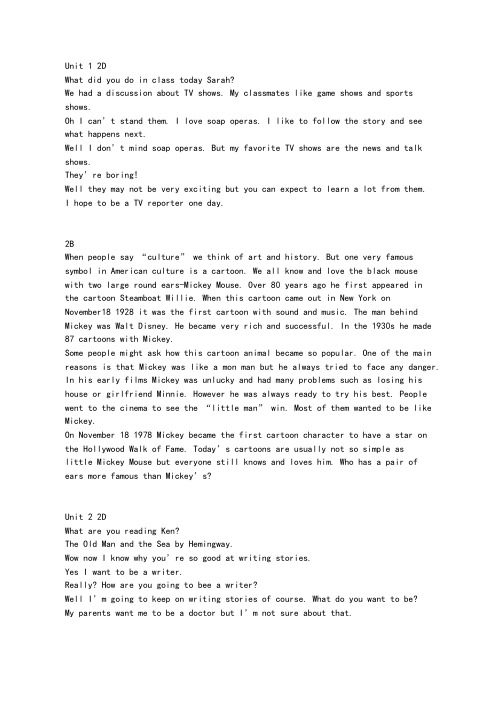
Unit 1 2DWhat did you do in class today Sarah?We had a discussion about TV shows. My classmates like game shows and sports shows.Oh I can’t stand them. I love soap operas. I like to follow the story and see what happens next.Well I don’t mind soap operas. But my favorite TV shows are the news and talk shows.They’re boring!Well they may not be very exciting but you can expect to learn a lot from them.I hope to be a TV reporter one day.2BWhen people say “culture” we think of art and history. But one very famous symbol in American culture is a cartoon. We all know and love the black mousewith two large round ears-Mickey Mouse. Over 80 years ago he first appeared inthe cartoon Steamboat Willie. When this cartoon came out in New York onNovember18 1928 it was the first cartoon with sound and music. The man behind Mickey was Walt Disney. He became very rich and successful. In the 1930s he made 87 cartoons with Mickey.Some people might ask how this cartoon animal became so popular. One of the main reasons is that Mickey was like a mon man but he always tried to face any danger. In his early films Mickey was unlucky and had many problems such as losing his house or girlfriend Minnie. However he was always ready to try his best. People went to the cinema to see the “little man” win. Most of them wanted to be like Mickey.On November 18 1978 Mickey became the first cartoon character to have a star on the Hollywood Walk of Fame. Today’s cartoons are usually not so simple aslittle Mickey Mouse but everyone still knows and loves him. Who has a pair ofears more famous than Mickey’s?Unit 2 2DWhat are you reading Ken?The Old Man and the Sea by Hemingway.Wow now I know why you’re so good at writing stories.Yes I want to be a writer.Really? How are you going to bee a writer?Well I’m going to keep on writing stories of course. What do you want to be?My parents want me to be a doctor but I’m not sure about that.Well don’t worry. Not everyone knows what they want to be. Just make sure youtry your best. Then you can be anything you want!Yes you’re right.2B1.To question the idea of making resolutions (2) To give the meaning ofresolution (3) To discuss the different kinds of resolutions.2.Do you know what a resolution is? It’s a kind of promise. Most of thetime we make promises to other people.(“Mom I promise I’m going to tidymy room when I get back from school.”) However promises you make toyourself are resolutions and the most mon kind is New Year’s resolutions.__________________When we make resolutions at the beginning of the yearwe hope that we are going to improve our lives. Some people write downtheir resolutions and plans for the ing year. This helps them to remembertheir resolutions. Others tell their family and friends about theirwishes and plans.3.There are different kinds of resolutions. Some are about physical health. For example some peoplepromise themselves they are going to start an exercise program or eat less fast food. Many peoplemight say they are going to take up hobby like painting or taking photos or learn to play the guitar.Some resolutions have to do with better planning like making a weekly plan forschoolwork.______________4.Although there are differences most resolutions have one thing in mon. People hardly ever keep them!_________Sometimes the resolutions may be too difficult to keep. Sometims people just forget aboutthem. For this reason some people say the best resolution is to have no resolutions! How about you-will you make any next year?Unit 3 3DWhat are you reading Jill?It’s a book about the future.Sounds cool. So what will the future be like?Well cities will be more crowded and polluted. There will be fewer trees and the environment will be in great danger.That sounds bad! Will we have to move to other planets?Maybe. But I want to live on the earth.Me too. Then what can we do?We can use less water and plant more trees. Everyone should play a part insaving the earth.3B Do you Think You Will Have Your Own Robot?1.When we watch movies about the future we sometimes see robots. They areusually like human servants. They help with the housework and do jobslike working in dirty or dangerous places.2.Today there are already robots working in factories. Some can help to build cars and they do simplejobs over and over again. Fewer people will do such jobs in the future because they are boring butrobots will never get bored.3.Scientists are now trying to make robots look like humans and do the same things as we do. Somerobots in Japan can walk and dance. They are fun to watch. However some scientists believe thatalthough we can make robots move like people it will be difficult to make them really think like ahuman. For example scientist James White thinks that robots will never be able to wake up and knowwhere they are. But many scientists disagree with Mr. White. They think that robots will even beable to talk like humans in 25 to 50 years.4.Some scientists believe that there will be more robots in the future. However they agree it may takehundreds of years. These new robots will have many different shapes. Some will look like humans andothers might look like animals. In India for example scientists made robots that look like snakes.If building fall down with people inside these snake robots can help look for people under thebuildings. This was not possible 20 years ago. But puters and rockets also seemed impossible 100years ago. We never know what will happen in the future!Unit 4 4DSam I want to make Russian soup for a party on Saturday. Can you tell me how? Sure. First buy some beef one cabbage four carrots three potatoes five tomatoes and one onion. Then cut up the vegetables.What’s next?Next put the beef carrots and potatoes into a pot and add some water. After that cook them for 30 minutes Then add the cabbage tomatoes and onion and cook for another 10 minutes.OK that’s it?No one more thing. Finally don’t forget to add some salt.4B Thanksgiving in the United StatesIn most countries people usually eat traditional food on special holidays. A special day in the United States is Thanksgiving. It is always on the fourth Thursday in November and is a time to give thanks for food in the autumn. Atthis time people also remember the first travelers from England who came to live in America about 400 years ago. These travelers had a long hard winter and many of them died. In the next autumn they give thanks for life and food in their new home. These days most Americans still celebrate this idea of giving thanks by having a big meal at home with their family. The main dish of this meal is almost always turkey a large bird.Making a turkey dinnerHere is one way to make turkey for a Thanksgiving dinner.•First mix together some bread pieces onions salt and pepper.•Next fill the turkey with this bread mix.•Then put the turkey in a hot oven and cook it for a few hours.•When it is ready place the turkey on a large plate and cover it with gravy.•Finally cut the turkey into thin pieces and eat the meat with vegetables like carrots and potatoes.Unit 5 5DHey Nick can you e to my house on Saturday? My cousin Sam from Xi’an is goingto be here.Oh Sam! I remember we went bike riding together last fall when he visited you. Yes that’s right.I’d love to e but I’m afraid I can’t. I have an exam on Monday so I must prepare for it.That’s really too bad! Oh but Sam isn’t leaving until next Wednesday. Can you hang out with us on Monday night?Sure! Catch you on Monday!5BHi DavidWhat a great idea! I really like Ms. Steen a lot. She helped me to improve my English so much. I’m sad to see her go and this party is the best way to say “Thank you and goodbye.” I can help to buy some of the food and drinks. I can also help to bring Ms. Steen to the party. I already have a great idea about how to do that J He WeiHi DavidThanks so much for planning this. I’d love to e to the party but I’m not available. My family is taking a trip to Wuhan at the end of this month to visit my aunt and uncle. However I’d still be glad to help out with any of the party preparations like planning the games. Let me know if you need my help. JakeDear classmatesAs I’m sure you know by now our favorite teacher Ms Steen is leaving soon to go back to the US. We’re very sad that she’s leaving because she is a fun teacher. To show how much we’re going to miss her let’s have a surprise party for her next Friday the 28th!Can you e to the party? If so can you help with any of these things?Please tell me by this Friday.1.Buy food and drinks. 2) Think of games to play. 3) Prepare things weneed for the games (glue paper pens…)4) Bring Ms. Steen to the party without telling her so that she can be surprised.I look forward to hearing from you all. David.5ADear ParentsI would like to invite you to the opening of our new library at No.9 High School. The opening will be on the moring of Wednesday January 8th at 9:00. After thisyou can enjoy our school concert Then lunch will be in the school hall at 12:00.I would also like to invite each parent to bring one book as a gift for the new library. Please reply in writing to this invitation by Friday December 20th.Larry SmithHeadmasterUnit 6 6DHey Ben. For the party next week should we ask people to bring food?No let’s order food from a restaurant. If we ask people to bring food they’lljust bring potato ships and chocolate because they’ll be too lazy to cook.OK For the game do you think we should give people some small gifts if they win?I think that’s a great idea! If we do that more people will want to play the games.Yes the games will be more exciting too.6BStudents these days often have a lot of worries. Sometimes they have problemswith their schoolwork and sometimes with their friends. What can they do about this? Some people believe the worst thing is to do nothing. Laura Mills ateenager from London agrees.” Problems and worries are normal in life “says Laura. “But I think talking to someone helps a lot. Unless we talk to someone we’ll certainly feel worse.”Laura once lost her wallet and worried for days she was afraid to tell herparents about it. She even walked three miles to school each day because shedidn’t have any money. She just kept thinking “If I tell my parents they’llbe angry!” In the end she talked to her parents and they were really understanding. Her dad said he sometimes made careless mistakes himself. Theygot her a new wallet and asked her to be more careful. “I will always rememberto share my problems in the future!” Laura says.Robert Hunt advises students about mon problems. He feels the same way as Laura. “It is best not to run away from our problems. We should always try to solve them.” He thinks the first step is to find someone you trust to talk to. Thisperson doesn’t need to be an expert like himself. Students often forget that their parents have more experience and are always there to help them. In English we say that sharing a problem is like cutting it in half. So you’re half way to solving a problem just by talking to someone about it!Unit 7 7DLisa are you OK?I have a headache and I can’t move my neck. What should I do? Should I take my temperature?No it doesn’t sound like you have a fever. What did you do on the weekend?I played puter games all weekend.That’s probably why. You need to take breaks away from the puter.Yeah I think I sat in the same way for too long without moving.I think you should lie down and rest. If you head and neck still hurt tomorrow then go to a doctor.OK Thanks Mandy7B He Lost His Arm But Is Still ClimbingAron Ralston is an American man who is interested in mountain climbing. As a mountain climber Aron is used to taking risks. This is one of the exciting things about doing dangerous sports. There were many times when Aron almost lost his life because of accidents. On April 262003 he found himself in a very dangerous situation when climbing in Utah.On that day Aron’s arm was caught under a 200-kilo rock that fell on him when he was climbing by himself in the mountains. Because he could not free his arm he stayed there for five days and hoped that someone would find him. But when his water ran out he knew that he would have to do something to save his own life. He was not ready to die that day. So he used his knife to cut off half his right arm. Then with his left arm he bandaged himself so that he would not lose too much blood. After that he climbed down the mountain to find help.After losing his arm he wrote a book called Between a Rock and a Hard Place. This means being in a difficult situation that you cannot seem to get out of. In this book Aron tells of the importance of making good decisions and of being in control of one’s life. His love for mountain climbing is so great that he kept on climbing mountains even after this experience.Do we have the same spirit as Aron? Let’s think about it before we find ourselves” between a rock and a hard place” and before we have to make a decision that could mean life or death.Unit 8 8DHi Tom. I’m making some plans to work in an old people’s home this summer. Really? I did that last summer!Oh what did they ask you to help out with?Mmm… things like reading the newspaper to the old people or just talking to them. They told me stories about the past and how things used to be.That sounds interesting.Yeah a lot of old people are lonely. We should listen to them and care for them. You’re right. I mean we’re all going to be old one day.too.8BDear Miss LiI’d like to thank you for giving money to Animal Helpers. I’m sure you knowthat this group was set up to help disabled people like me. You helped to makeit possible for me to have Lucky. Lucky makes a big difference to my life. Let me tell you my story.What would it be like to be blind or deaf? Or imagine you can’t walk or useyour hands easily. Most people would never think about this but many people have these difficulties. I can’t use my arms or legs well so normal things like answering the telephone opening and closing doors or carrying things aredifficult for me. Then one day last year a friend of mine helped me out. She talked to Animal Healers about getting me a special trained dog. She alsothought a dog might cheer me up. I love animals and I was excited about the idea of having a dog.After six months of training with a dog at Animal Helpers I was able to bringhim home. My dog’s name is Lucky- A good name for him because I feel very lucky to have him. You see I’m only able to have a “dog-helper” because of your kindness! Lucky is very clever and understands many English words. He can understand me when I give him orders. For example I say “Lucky! Get my book”and he does it at once.Lucky is a fantastic dog. I’ll send you a photo of him if you like and I could show you how he helps me. Thank you again for changing my life.Best wishesBen Smith。
人教版七下英语Unit7第1课时(SectionA 1a-2d)

2. It’s raining! 天在下雨!(教材P37 标题) rain /reɪn/ v. 下雨 n. 雨水 (1) rain在此作动词,意为“下雨”,raining是其动词-ing 形式。 ➢ It often rains in summer. 夏天经常下雨。 ➢ It’s raining in Guangzhou. 广州正在下雨。 (2) rain还可作不可数名词,意为“雨水”。the rains表 示“雨季”。 ➢ There is a lot of rain here every year。这里每年雨水都很多。
Language point Aunt Sally is cooking. 萨莉婶婶在做饭。 (教材P38 2b) cook /kʊk/ v. 做饭
cook在此作不及物动词,意为“做饭”。 ➢ My grandma is cooking. 我奶奶正在做饭。 【拓展】(1) cook还可作及物动词,意为“烹饪”,其后 可接双宾语,cook sb. sth. = cook sth. for sb., 意为“为某人 做……(饭)”。
Unit 7 It’s raining!
Section A 1a-2d
初中英语 七年级下册 RJ
Learning goals
1. New words: weather, rain, windy, cloudy, sunny, snow, cook, bad, park, message, him, could, back, problem
Uncle Joe is __p_la_y_in__g_ __b_a_s_k_e_tb_a_l_l _ .
2a Listen and number the pictures [1-4].
七下1~12单元单词

英语七下1~12单元单词Unit 1guitar [gɪ'tɑː] n.吉他join. [dʒɒɪn] v.参加;加入dance [dɑːns] v.跳舞;舞蹈swim [swɪm] v.游泳sing [sɪŋ] v.唱;唱歌chess [tʃes] n.国际象棋paint [peɪnt] v.画画speak spiːk] v.说;说话piano [pɪ'ænəʊ] n.钢琴drum [drʌm] n.喇叭violin [vaɪə'lɪn] n.小提琴or [ɔː] conj.或者musician [mjuː'zɪʃ(ə)n] n.音乐家show [ʃəʊ] n.演出;表演 v.展示draw [drɔː] v.画story ['stɔːrɪ] n.故事;小说tell [tel] v. n.讲述;告诉write [raɪt] v.写作,写字talk [tɔːk] v. n.说话;谈话also ['ɔːlsəʊ] adv.也;而且people ['piːp(ə)l] n.人;人们center(=centre) ['sentə] n中心,中央home [həʊm] n. 家,活动本部.adv.到家,在家today [tə'deɪ] adv.在今天make [meɪk] v.使或为;制造weekend. [wiːk'end] n.周末teach [tiːtʃ] v.教,讲授Unit 2usually ['juʒuəli] adv.通常up [ʌp] adv. 向上dressed ['dresɪd] adj.穿着衣服forty ['fɔːtɪ] num四十fifty ['fɪftɪ] num五十never ['nevə] adv.从来;决不early ['ɜːlɪ] adj.早的station ['steɪʃ(ə)n] n.电视台;车站funny ['fʌnɪ] adj.奇怪的;滑稽好笑的exercise ['eksəsaɪz] n.锻炼;练习group [gruːp] n.组群shower ['ʃaʊə] v.淋浴;淋浴器(间)take a shower 淋浴;洗澡o'clock (=of the clock) adv.点钟(只用于正点)work [wɜːk] n.& v.工作brush [brʌʃ] v.刷teeth [tiːθ] n.(tooth的复数形式)牙齿job [dʒɒb] n.工作;零工;任务;职位best [best] adj.& adv. (good, well的比较级) 最好的(地) half [hɑːf] 一半,半数past [pɑːst] 过去,往事quarter ['kwɔːtə] n.一刻钟;四分之一homework ['həʊmwɜːk] n.家庭作业run [rʌn] v. 跑;奔walk [wɔːk] 行走;步行clean. [kliːn] v.打扫;弄干净;adj.干净的quickly ['kwɪklɪ] adv.很快的either ['aɪðə] adv.或者;也lot [lɒt] pron. 大量;许多taste [teɪst] v.有……的味道;品尝n.味道life [laɪf] n. 生活,生存Unit 3train [treɪn] 火车bus 公交车subway ['sʌbweɪ] 地铁ride [raɪd]v.骑n.旅行(过去式:rode [rəʊd] 过去分词:ridden.['rɪdn.])bike [baɪk] 自行车sixty ['sɪkstɪ] 六十seventy ['sev (ə)ntɪ] 七十eighty ['eɪtɪ] 八十ninety ['naɪntɪ] 九十hundred ['hʌndrəd] 一百far [fɑː] 很minute ['mɪnɪt] 分钟kilometer ['kɪlə,mitɚ] 公里new [njuː] 新的every ['evrɪ] 每一个by [baɪ] 通过,被drive [draɪv] 开车live [lɪv] 活的,生动的stop [stɒp] 停止cross [krɔs] 交叉river ['rɪvə] 河,江many ['menɪ] 许多village [' vɪlɪdʒ] 村庄,村民between [bɪ'twiːn] 介于……之间bridge [brɪdʒ] 桥boat [bəʊt] 小船ropeway ['rop,we] n. 索道空中缆索year [jɪə] n. 年;年度;岁afraid [ə'freɪd] 害怕;惧怕like [laɪk] 像;怎么样(介词)leave [liː v] 离开;left (leave的过去式) dream [driːm] 梦想;睡梦true [truː] 真的;符合实际的Unit 4rule [ruːl] 规则;规章arrive [ə'raɪv] 到达hallway ['hɔːlweɪ] 走廊;过道hall [hɔːl] 大万礼堂listen ['lɪs(ə)n] 听;倾听fight [faɪt] 打架;战斗sorry ['sɒrɪ] 抱歉的;难过的;惋惜的outside [aʊt'saɪd] adv.在外面adj.外面的wear [weə] 穿;戴important [ɪm'pɔːt(ə)nt] 重要的bring [brɪŋ] 带来;取来player ['pleɪə] 播放机;运动员uniform ['juːnɪfɔːm] 校服;制服quiet ['kwaɪət] 安静的out [aʊt] 外出dish [dɪʃ] 碟;盘(复数dishes)night [naɪt] 晚上before [bɪ'fɔː] prep./conj.在……以前adv.以前dirty ['dɜːtɪ] 脏的kitchen ['kɪtʃɪn] 厨房more [mɔː] 更多的noisy ['nɒɪzɪ] 吵闹的relax [rɪ'læks] 放松;休息read [riːd] 读;阅读terrible ['terɪb(ə)l] 非常讨厌的;可怕的feel [fiːl] 感受;觉的strict [strɪkt] 严格的;严厉的remember [rɪ'membə] 记住;记起follow ['fɒləʊ] 遵循;跟随luck [lʌk] 幸运;运气keep [kiːp] 保持;保留hair [heə] 头发;毛发learn [lɜːn] 学习;学会Unit 5tiger ['taɪgə] n. 老虎elephan.t ['elɪf(ə)n.t] n. 大象koala [kəʊ'ɑːlə] n. 树袋熊panda ['pændə] n. 熊猫lion ['laɪən] n. 狮子giraffe [dʒə'rɑ:f] n. 长颈鹿cute [kjuːt] adj可爱的;机灵的lazy ['leɪzɪ] 懒散的;懒惰的smart [smɑːt] adj. 聪明的beautiful ['bjuːtɪfʊl] adj. 美丽的;美好的scary ['skeərɪ] adj吓人的;恐怖的kind [kaɪn.d] n. 种类Australia [ɒ'streɪlɪə] n. 澳大利亚south [saʊθ] adj 南方的n. 南;南方Africa ['æfrɪkə] n. 非洲pet [pet] n. 宠物leg [leg] n. 腿cat [kæt] n. 猫sleep [sliːp] n.睡觉animal ['ænɪm(ə)l] n. 动物friendly ['fren(d)lɪ] adj. 友好的shy [ʃaɪ] adj 羞怯的;腼腆的save [seɪv] v. 救;救助symbol ['sɪmb(ə)l] n.象征flag [flæg]n. 旗;旗帜forget [fə'get] v.忘记;旗杆place [pleɪs] n. 地点;位置water ['wɔːtə] n.水danger ['deɪn(d)ʒə] n. 危险cut [kʌt] v. 砍;切down [daʊn] adv.(坐躺倒)下tree [triː] n. 树kill [kɪl] v.杀死;弄死ivory ['aɪv(ə)rɪ] n.象牙over ['əʊvə] prep. 超过;多于在……上方zoo [zuː] n.动物园Unit 6newspaper ['n.juːzpeɪpə] n.报纸use [juːz] v.使用;运用soup [suːp] n.汤wash [wɒʃ] v.洗movie ['muːvɪ] n.电影just [dʒʌst] adv. 只是;恰好house [haʊs] n.房子drin.k [drɪŋk] v.喝 n.饮料tea [tiː] n.茶;茶叶tomorrow [tə'mɒrəʊ] adv.在明天pool [puːl] n.(复数pools) 游泳池shop [ʃɒp] v.购物supermarket ['suːpəmɑːkɪt] n. 超市man [mæn] n.男人;人host [həʊst] n.主人;东道主study ['stʌdɪ] v. 学习;研究state [steɪt] n. 洲the United States [ði juˈnaɪtɪd stets] 美国;美利坚合众国American adj美国的;美洲的n.美国人;美洲人dragon ['dræg(ə)n] n.龙young [jʌŋ] 幼小的,年轻的race [reɪs] 竞赛any ['enɪ] 任何一个;任一的other ['ʌðə] adj. 另外的children ['tʃɪldrən] n. 儿童miss [mɪs] 怀念,思念wish [wɪʃ] v. 希望delicious [dɪ'lɪʃəs] adj 可口的;美味的still [stɪl] adv. 还,仍然living room ['lɪvɪŋ ru:m] 客厅Unit 7rain [reɪn] 下雨;雨水windy ['wɪndɪ] 多风的cloudy ['klaʊdɪ] 多云的sunny ['sʌnɪ] 晴朗的snow [snəʊ]下雪;雪(Snow)weather ['weðə] 天气cook [kʊk] 做饭bad [bæd] 坏的;糟的park [pɑːk] 公园message ['mesɪdʒ]信息;消息take a message 捎个口信;传话him 他(he的宾格)could [kʊd] 能;可以back [bæk] 回来;回原处call (sb) back 回电话problem ['prɒbləm] 困难;难题again [ə'gen;ə'geɪn] 再一次;又一次dry [draɪ] 干燥的cold [kəʊld] 寒冷的;冷的hot [hɒt] 热的warm [wɔːm] 温暖的visit ['vɪzɪt] 拜访;参观Canada ['kænədə] 加拿大summer ['sʌmə] 夏天;夏季sit [sɪt] 坐juice [dʒuːs] 果汁;饮料soon [suːn] 不久;很快vacation [və'keɪʃ(ə)n] 假期on (a) vacation 度假hard [hɑːd] 努力地;困难的Europe ['jʊrəp] 欧洲mountain ['maʊntɪn] 高山country ['kʌntrɪ] 国;国家skate [skeɪt] 滑冰snowy ['snəʊɪ] 下雪的winter ['wɪntə] 冬天;冬季Russian ['rʌʃ(ə)n] 俄罗斯的;俄罗斯人;俄语snowman ['snəʊmæn] 雪人rainy ['reɪnɪ] 阴雨的;多雨的Joe [dʒəʊ] 乔Jeff [dʒef] 杰夫Moscow ['mɔskəʊ] 莫斯科Toronto [tə'rɑnto] n. 多伦多Boston ['bɔstən] 波士顿Unit 8post [pəʊst] 邮政office ['ɒfɪs] 办公室post office 邮局police [pə'liːs] 警察police station ['steɪʃən] 警察局hotel [həʊ'tel] 旅店;酒店restaurant ['restrɒnt] 餐馆bank [bæŋk] 银行hospital ['hɒspɪt(ə)l] 医院street [striːt] 大街pay [peɪ] 付费payphone ['peifəun] 付费电话near[nɪə] 在……附近across [ə'krɒs] 过;穿过across from 在……对面front [frʌnt] 前面in front of 在……前面behind [bɪ'haɪnd] 在……后面town [taʊn]镇;市镇around [ə'raʊnd] 到处;大约north [nɔːθ] 北;北方;北方的along [ə'lɒŋ] 沿着go along 沿着(这条街)走turn [tɜːn] 转向;翻right [raɪt] 向右边;右边left [left] 向左边;左边run right 向右转crossing ['krɒsɪŋ] 十字路口neighborhood ['neɪbə,hʊd] 街区;街坊spend [spend] 花(时间、钱等)spend time 花时间climb [klaɪm] 爬road [rəʊd] 路often ['ɒf(tə)n] 时常;常常air [eə] 空气sun shine 阳光free [friː] 免费的enjoy [ɪn'dʒɒɪ] 享受;喜爱enjoy reading ['riːdɪŋ] 喜欢阅读easily ['iːzɪlɪ] 容易地money ['mʌnɪ] 钱Unit 9curly ['kɜːlɪ] 卷曲的straight [streɪt] 直的tall [tɔːl] 高的medium ['miːdɪəm] 中等的height [haɪt] 身高;高度of medium height 中等身高thin [θɪn] 瘦的heavy ['hevɪ] 重的build [bɪld] 身材of medium build 中等身材tonight [tə'naɪt] 今夜little ['lɪt(ə)l] 小的a little 一点,少量cinema ['sɪnɪmə] 电影院glasses ['glɑːsɪz] 眼镜later ['leɪtə] 以后handsome ['hæns(ə)m] 英俊的actor ['æktə] 演员actress ['æktrɪs] 女演员person ['pɜːs(ə)n] 人nose [nəʊz] 鼻子blonde [blɒnd] adj. 金黄色的mouth [maʊθ] 嘴round [raʊnd] 圆形的face [feɪs] 脸eye [aɪ] 眼睛singer ['sɪŋə(r)] 歌手artist ['ɑːtɪst] 艺术家crime [kraɪm] 犯罪活动criminal ['krɪmɪn(ə)l] 犯罪put [pʊt] 放each [iːtʃ] 每个,各自way [weɪ] 方式,路线describe [dɪ'skraɪb] 描述differently ['dɪfərəntlɪ] 不同的another[ə'nʌðə] 另一,又一end [end] 结尾,尽头in the end 最后real [riːl] 真正的jeans [dʒinz] 牛仔裤Johnny ['dʒɒnɪ] 约翰尼Dean [din] 迪安Tina ['tinə] 蒂娜Jackson ['dʒæksn] 杰克逊Unit 10noodle ['nuːd(ə)l] 面条mutton ['mʌt(ə)n] 羊肉beef [biːf] 牛肉cabbage [ˈkæbɪdʒ] 卷心菜;洋白菜potato [pə'teɪtəʊ] 土豆;马铃薯special ['speʃ(ə)l] 特色菜;特价品;特别的;特殊的would [wʊd; wəd] (表示意愿)愿意would like 愿意;喜欢yet (常用于否定句或疑问句)还;仍然large [lɑːdʒ] 大号的;大的order ['ɔːdə] 点菜;命令take one's order点菜size [saɪz] 大小;尺码bowl [bəʊl] 碗one(large)bowl of 一(大)碗tofu ['təʊfuː] 豆腐meat [miːt] (可食用的)肉dumpling ['dʌmplɪŋ] 饺子porridge ['pɒrɪdʒ] 粥;面糊onion ['ʌnjən] 洋葱fish [fɪʃ] 鱼;鱼肉pancake ['pænkeɪk] 烙饼;薄饼world [wɜːld] 世界around [ə'raʊnd] the world 世界各地answer ['ɑːnsə] 答案;回答different ['dɪf(ə)r(ə)nt] 不同的cake [keɪk] 蛋糕candle ['kænd(ə)l] 蜡烛age [eɪdʒ] 年龄make a wish [wɪʃ] 许愿blow [bləʊ] 吹blow out 吹灭if 如果will [wɪl] 会the UK(=the United Kingdom) 英国candy ['kændɪ] 糖果lucky幸运的popular 受欢迎的;普遍的get popular 受欢迎;流行cut up 切碎idea [aɪ'dɪə] 想法;主意bring good luck[lʌk] to…给……带来好运Unit 11milk [mɪlk] 挤奶cow[kaʊ] n. 奶牛,母牛milk a cow 给奶牛挤奶horse [hɔːs] 马ride [raɪd] a horse 骑马feed [fiːd] 喂养;饲养feed chickens ['tʃɪkɪns] 喂鸡farmer ['fɑːmə] 农民;农场主quite [kwaɪt] 相当;安全quite a lot (of…) 许多anything ['enɪθɪŋ] (常用于否定句或疑问句)任何东西;任何事物grow [grəʊ] 种植;生长;发育farm [fɑːm] 农场;务农;种田pick [pɪk] 采;摘excellent ['eks(ə)l(ə)nt] 极好的;优秀的countryside ['kʌntrɪsaɪd] 乡村;农村in the countryside 在乡下;在农村yesterday ['jestədeɪ;-dɪ] 昨天flower ['flaʊə] 花worry ['wʌrɪ] 担心;担忧luckily ['lʌkɪlɪ] 幸运地;好运地sun [sʌn] 太阳museum [mjuː'zɪəm] 博物馆fire ['faɪə] 火灾fire station ['steɪʃ(ə)n] 消防站painting ['peɪntɪŋ] 油画;绘画exciting [ɪk'saɪtɪŋ;ek-] 使人兴奋的;令人激动的lovely ['lʌvlɪ] 可爱的expensive [ɪk'spensɪv;ek-] 昂贵的cheap [tʃiːp] 廉价的;便宜的slow [sləʊ] 缓慢的;迟缓的fast [fɑːst] 快地(的)robot ['rəʊbɒt] 机器人guide [gaɪd] 导游;向导gift [gɪft] 礼物;赠品all in all 总的说来everything ['evrɪθɪŋ] 一切;所有事物interested ['ɪnt(ə)rɪstɪd] 感兴趣的be interested in 对……感兴趣dark [dɑːk] 黑暗的;昏暗的hear(heard) [hɪə] 听到;听见Carol ['kær(ə)l] 卡罗尔Unit 12camp [kæmp] 扎营lake [leɪk] 湖,湖泊beach [biːtʃ] 海滩,沙滩badminton ['bædmɪnt(ə)n] 羽毛球运动sheep [ʃiːp] 羊,绵羊as [æz;əz] 作为,当做natural['nætʃ(ə)r(ə)l] adj. 自然的butterfly 蝴蝶tired [taɪəd] 疲倦的stay [steɪ] 停留stay up late深夜不留away [ə'weɪ] 离开run away 跑开mouse [maʊs] 老鼠baby ['beɪbɪ] 幼小的shout [ʃaʊt] 呼叫,喊叫shout at…冲……大声叫嚷woof [wʊf] (狗叫声)汪汪language ['læŋgwɪdʒ] 语言fly [flaɪ] 飞kite [kaɪt] 风筝fly a kite 放风筝high [haɪ] 高的(地)high school中学ago [ə'gəʊ] 以前India ['ɪndɪə] 印度tent [tent] 帐篷put up 搭起,举起moon 月亮surprise [sə'praɪz] 惊奇,惊讶get a surprise 吃惊snake [sneɪk] 蛇scared [skeəd] 惊慌的move [muːv] 移动shout to…对……大声喊叫start [stɑːt] 开始,着手jump [dʒʌmp] 跳跃up and down 上上下下wake [weɪk] 弄醒,醒into ['ɪntʊ; 'ɪntə] 到……里面forest ['fɒrɪst] 森林ear [ɪə] 耳朵Lucy ['lusi] 露西。
冀教版七下英语(带翻译)

二单元(7-12)7what`s your project about 你的课题是什么Did you have a good rest after out trip ? 在我们的旅行之后你好好休息了吗?Are you ready for your project ? 你准备好你的课题了吗?We heard a lot about him on the Silk Road我们在丝绸之路上听说了许多关于他的事情。
My project is about some places of interest in china我的课题是关于中国的一些名胜古迹I still can`t believe it 我仍旧不能相信他They don`t have donuts on the Silk Road 在丝绸之路上他们没有面包圈。
You can find donuts anywhere in china 你可以在加拿大的任何地方找到面包圈The Silk Road is about history and culture ,hot donuts丝绸之路是关于文化的而不是面包圈Let`s go to the library and work on our projects 咱们去图书馆继续做我们的课题A jok is something funny you say to make people laugh笑话是你为了让人们笑而说的一些事情Can you translate any jokes into English? 你能把一些笑话翻译成英语吗?8 Marco Polo and the Silk Road 马可波罗和丝绸之路Marco Polo was a man form Italy. 马可波罗是一个意大利人。
At the age of 17 ,he went to china. 在17岁时,他来到中国He travelled along the Silk Road with his father and uncle.他和他的父亲、叔叔一起沿着丝绸之路旅行Together,they moved goods between Eruope and Asia on the Silk Road.他们一起通过丝绸之路,在欧洲和亚洲之间运送商品进行贸易。
鲁教版 7年级下英语课文翻译
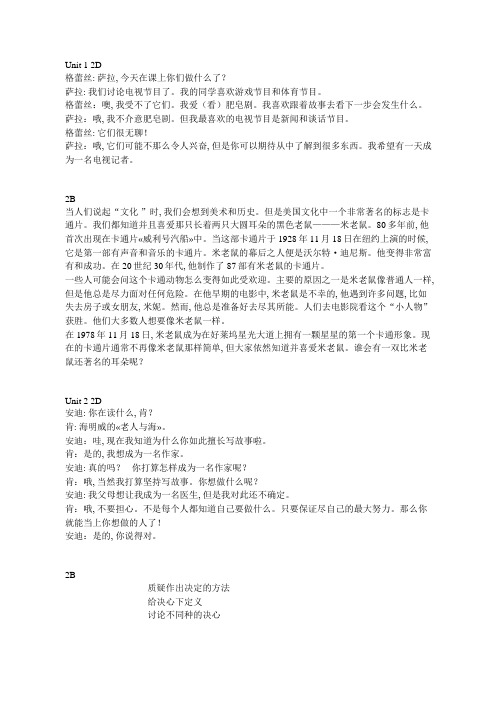
Unit 1 2D格蕾丝: 萨拉, 今天在课上你们做什么了?萨拉: 我们讨论电视节目了。
我的同学喜欢游戏节目和体育节目。
格蕾丝:噢, 我受不了它们。
我爱(看)肥皂剧。
我喜欢跟着故事去看下一步会发生什么。
萨拉:哦, 我不介意肥皂剧。
但我最喜欢的电视节目是新闻和谈话节目。
格蕾丝: 它们很无聊!萨拉:哦, 它们可能不那么令人兴奋, 但是你可以期待从中了解到很多东西。
我希望有一天成为一名电视记者。
2B当人们说起“文化”时, 我们会想到美术和历史。
但是美国文化中一个非常著名的标志是卡通片。
我们都知道并且喜爱那只长着两只大圆耳朵的黑色老鼠———米老鼠。
80多年前, 他首次出现在卡通片«威利号汽船»中。
当这部卡通片于1928年11月18日在纽约上演的时候, 它是第一部有声音和音乐的卡通片。
米老鼠的幕后之人便是沃尔特·迪尼斯。
他变得非常富有和成功。
在20世纪30年代, 他制作了87部有米老鼠的卡通片。
一些人可能会问这个卡通动物怎么变得如此受欢迎。
主要的原因之一是米老鼠像普通人一样, 但是他总是尽力面对任何危险。
在他早期的电影中, 米老鼠是不幸的, 他遇到许多问题, 比如失去房子或女朋友, 米妮。
然而, 他总是准备好去尽其所能。
人们去电影院看这个“小人物”获胜。
他们大多数人想要像米老鼠一样。
在1978年11月18日, 米老鼠成为在好莱坞星光大道上拥有一颗星星的第一个卡通形象。
现在的卡通片通常不再像米老鼠那样简单, 但大家依然知道并喜爱米老鼠。
谁会有一双比米老鼠还著名的耳朵呢?Unit 2 2D安迪: 你在读什么, 肯?肯: 海明威的«老人与海»。
安迪:哇, 现在我知道为什么你如此擅长写故事啦。
肯:是的, 我想成为一名作家。
安迪: 真的吗?你打算怎样成为一名作家呢?肯:哦, 当然我打算坚持写故事。
你想做什么呢?安迪: 我父母想让我成为一名医生, 但是我对此还不确定。
七下英语短语1-12单元各20个

对于七年级下册英语学习而言,短语的掌握是非常重要的。
下面将按照各个单元,列举出每个单元中的20个重要英语短语,希望对同学们的学习有所帮助。
1. Unit 1(1) go for a walk - 散步(2) have breakfast - 吃早餐(3) go to school - 去学校(4) have lunch - 吃午饭(5) go home - 回家(6) study for the test - 为考试学习(7) playputer games - 玩电脑游戏(8) get up - 起床(9) see a film - 看电影(10) listen to music - 听音乐(11) watch TV - 看电视(12) get ready - 准备好(13)e back - 回来(14) do homework - 做作业(15) for example - 例如(16) at the weekend - 在周末(17) in the morning - 在早上(18) at night - 在晚上(19) have a good time - 玩得愉快(20) go to bed - 去睡觉2. Unit 2(1) take out - 取出(2) look after - 照顾(3) put on - 穿上(4) have fun - 玩得开心(5) kinds of - 种类(6) make a snowman - 堆雪人(7) take photos - 拍照(8) give sb. a present - 给某人礼物(9) make a kite - 做风筝(10) move to - 搬到(11) clean the classroom - 打扫教室(12) have a kite show - 举办风筝秀(13) on Sunday - 在星期天(14) on weekends - 在周末(15) in summer - 在夏天(16) at a time - 一次(17) in the future - 在将来(18) at the same time - 同时(19) at last - 最后(20) at the moment - 眼下3. Unit 3(1) a few - 一些(2) a little - 一点(3) a pair of - 一双(4) a lot of - 许多(5) as well - 也(6) be strict with - 对...要求严格(7) call up - 打通信方式(8) cheer up - 高兴起来(9) get along with - 与...相处(10) help out - 帮助(11) look up - 查阅(12) pick up - 拾起(13) play the piano - 弹钢琴(14) have a chat - 聊天(15) have a rest - 休息(16) by the pool - 在泳池边(17) at the weekend - 在周末(18) for a long time - 长时间(19) at first - 起初(20) at once - 立刻4. Unit 4(1) get to - 到达(2) feel like - 想要(3) hear from - 听到(4) make friends - 交朋友(5) talk about - 谈论(6) get exercise - 锻炼身体(7) play baseball - 打棒球(8) go shopping - 购物(9) try on - 试穿(10) take a photo - 拍照(11) get to know - 了解(12) play the guitar - 弹吉他(13) in the evening - 在晚上(14) at the weekend - 在周末(15) at the same time - 同时(16) at the moment - 眼下(17) in the countryside - 在乡村(18) in the future - 在将来(19) for a moment - 一会儿(20) for a walk - 散步5. Unit 5(1) cut down - 砍倒(2) give out - 分发(3) take care of - 照顾(4) protect...from - 保护...免受(5) turn off - 关掉(6) turn on - 打开(7) take photos of - 拍摄...的照片(8) at the same time - 同时(9) for a change - 变一番(10) all the time - 一直(11) in the end - 最终(12) in the future - 在将来(13) in the morning - 在早上(14) in the afternoon - 在下午(15) in the evening - 在晚上(16) for example - 例如(17) at last - 最后(18) at once - 立刻(19) at the moment - 眼下(20) at first - 起初6. Unit 6(1) be interested in - 对...感兴趣(2) be good at - 擅长(3) be friendly to - 对...友好(4) look forward to - 期待(5) take part in - 参加(6) be busy with - 忙于(7) think about - 考虑(8) worry about - 担心(9) arrive in - 到达(10) be proud of - 为...感到自豪(11)e up with - 提出(12) play basketball - 打篮球(13) in the future - 在将来(14) at that time - 那时(15) at present - 目前(16) for a while - 一会儿(17) at the same time - 同时(18) for example - 例如(19) at last - 最后(20) at once - 立刻7. Unit 7(1) be excited about - 对...感到兴奋(2) be upset about - 对...感到沮丧(3) be worried about - 对...感到担忧(4) be happy about - 对...感到快乐(5) think of - 想到(6) hear of - 听说(7) at that time - 那时(8) at present - 目前(9) for a while - 一会儿(10) from now on - 从现在开始(11) be grateful to - 对...表示感谢(12) be popular with - 受...欢迎(13) in the future - 在将来(14) at the same time - 同时(15) in the end - 最终(16) for example - 例如(17) at last - 最后(18) at once - 立刻(19) at the moment - 眼下(20) at first - 起初8. Unit 8(1) have a big smile - 微笑着(2)e up - 走近(3) put on a show - 上演(4) cheer up - 欢起来(5) be afraid of - 害怕(6) on the other side of - 在...的另一边(7) on the left - 在左边(8) on the right - 在右边(9) be proud of - 为...骄傲(10) knock down - 撞倒(11) give out - 发放(12) on the playground - 在操场上(13) in the future - 在将来(14) at that time - 那时(15) at present - 目前(16) for a while - 一会儿(17) at the same time - 同时(18) at last - 最后(19) at once - 立刻(20) at the moment - 眼下9. Unit 9(1)e up - 走近(2) put on a show - 上演(3) cheer up - 欢起来(4) be afraid of - 害怕(5) be proud of - 为...骄傲(6) knock down - 撞倒(7) give out - 发放(8) on the playground - 在操场上(9) jump up - 跳起来(10) run around - 四处跑(11) stand up - 站起来(12) sit down - 坐下(13) in the future - 在将来(14) at that time - 那时(15) at present - 目前(16) for a while - 一会儿(17) at the same time - 同时(18) at last - 最后(19) at once - 立刻(20) at the moment - 眼下10. Unit 10(1) take out - 取出(2) look after - 照顾(3) put on - 穿上(4) have fun - 玩得开心(5) kinds of - 种类(6) make a snowman - 堆雪人(7) take photos - 拍照(8) give sb. a present - 给某人礼物(9) make a kite - 做风筝(10) move to - 搬到(11) clean the classroom - 打扫教室(12) go on - 继续(13) in the future - 在将来(14) at that time - 那时(15) at present - 目前(16) for a while - 一会儿(17) at the same time - 同时(18) at last - 最后(19) at once - 立刻(20) at the moment - 眼下11. Unit 11(1) be serious about - 对...认真(2) be proud of - 为...自豪(3) be excited about - 对...兴奋(4) be worried about - 担心(5) at the moment - 眼下(6) at last - 最后(7) at the same time - 同时(8) in the end - 最终(9) for example - 例如(10) from now on - 从现在开始(11) look up - 查阅(12) learn about - 了解(13) in the future - 在将来(14) at the same time - 同时(15) for a while - 一会儿(16) for example - 例如(17) at last - 最后(18) at once - 立刻(19) at the moment - 眼下(20) at first - 起初12. Unit 12(1) answer the phone - 接通信方式(2) ask for help - 请求帮助(3) call back - 回通信方式(4)e over - 过来(5) drop me off - 把我放下(6) go online - 上网(7) make a phone call - 打通信方式(8) pick me up - 接我(9) send an e-mail - 发送邮件(10) take a message - 捎个口信(11) have an idea - 有主意(12) in the future - 在将来(13) at the same time - 同时(14) in the end - 最终(15) for example - 例如(16) at the moment - 眼下(17) from now on - 从现在开始(18) at last - 最后(19) at once - 立刻(20) at the moment - 眼下以上是七年级下册英语各个单元中的20个重要短语,相信通过对这些短语的掌握,同学们在日常学习生活中会更加得心应手。
- 1、下载文档前请自行甄别文档内容的完整性,平台不提供额外的编辑、内容补充、找答案等附加服务。
- 2、"仅部分预览"的文档,不可在线预览部分如存在完整性等问题,可反馈申请退款(可完整预览的文档不适用该条件!)。
- 3、如文档侵犯您的权益,请联系客服反馈,我们会尽快为您处理(人工客服工作时间:9:00-18:30)。
七年级历史与社会(下)材料题专题训练
班级姓名学号
1、阅读材料,回答问题。
小华说:“我妈妈老是唠叨,使我非常心烦。
前天我社会考得特别好,老师表扬了我。
我兴致勃勃地回到家,却因为换下的鞋没放端正,从书架上取下的书没有还原等琐碎的事招来妈妈喋喋不休的教训,把我的好心境全破坏了。
每一天回家,我就生活在唠叨的空气里,妈妈一会儿说我磁带声音放得太响,一会儿说我坐过的椅子没放端正。
妈妈这么多的清规戒律,真使我心烦极了。
可她还振振有词地说:‘我就是要你养成这些好习惯!’”
①小华妈妈的这些习惯在原则上是否错误?
②你认为小华是否应该按照妈妈的要求去做?为什么?
点拨:否。
②小华应该按照妈妈的要求去做。
因为无论处在什么环境,我们都不应该以自我为中心。
家庭也是一个集体,有许多习惯是需要家庭成员互相理解共同遵守的。
遵循这些习惯有助于我们养成理解他人,关心他人的品质和豁达的胸襟。
2、阅读材料,回答问题。
七年级学生小赵的妈妈很会持家过日子,购买冰箱要买有氟的,认为便宜;购买洗衣粉要买含磷的,认为价廉;购买盒饭要买发泡性塑料饭盒装的,认为实惠;盛装生活垃圾只用一个塑料袋,从不分装,认为省事……
你认为小赵妈妈的消费行为是否合理?为什么?
点拨:小赵妈妈的行为不合理。
因为她在日常生活中没有环保意识,有氟冰箱会破坏臭氧层;含磷洗衣粉会污染水源;她所使用的一次性塑料饭盒不易分解,会给环境造成持久的影响;不把垃圾分类则不利于垃圾回收。
总之,她的这些习惯都会对环境造成不好的影响。
在现代文明生活中,应该树立注重环境保护的消费意识。
3、看漫画“披着羊皮的狼”,回答下列问题:
⑴你能说说这幅漫画反映了什么问题?
----反映网络是一个虚拟的世界,网络世界里有许多“披着羊皮的狼”,有许多“陷阱”。
⑵面对这样的问题,你有什么好的对策和建议?
----不要过于相信虚拟的世界,不要过分沉迷于网络,警惕网络世界里“披着羊皮的狼”;不要将自己的真实姓名、地址、联系方式告诉对方,学会保护自己;更不能听信花言巧语去约会网友;上网也要学会辨别真假。
(3)如果她的同学,你会如何劝说她?请把你准备和她交谈的话写下来。
--网上的朋友对你可能是一个陷阱;而且现实生活中对你好的人有很多,比如说你的父母、同学、老师,你觉得有心事的话可以跟她们说。
不要因为沉迷于网络而耽误了你的前途。
4.你是否赞成中学生上网聊天?结合体会,说说你的理由。
(请至少列出三个理由。
)
--网上交友时,你应该特别注意些什么呢?(1).不轻易说出自己的真实资料;(2).文明上网,不说粗言秽语;(3).不说与学生身份不符的话。
(4).不与网友约会。
5、阅读下列材料,再回答问题。
材料一随着网络技术的发展,互联网不可阻挡地走进人们的生活,人们可以在网上发邮件、查询资料、下载软件、购物等。
互联网大大拓展了人的视野,改变了人们的工作
方式和生活方式,在未来社会,不懂网络的人就是文盲。
材料二据报载,某校女生小李,自从迷上了网上聊天之后,结识了社会上一些不三不四的人,无心向学,又不听家长和学校的劝告,最后发展到离家出走。
(1)你认为网络会给青少年带来哪些乐趣和影响?
好处:通过网络获取丰富多彩的知识,遨游知识的海洋,满足求知欲,了解天下大事,拓展视野。
坏处:可能会过分迷恋网上聊天、游戏或查看不良网造成精神颓废,荒废学业甚至走上犯罪道路。
(2)如果你是小李的同学,你会如何劝说她?请把你准备和他交谈的话写下来:
网上的朋友对你可能是一个陷阱;而且现实生活中对你好的人有很多,比如说你的父母、同学、老师,你觉得有心事的话可以跟她们说。
不要因为沉迷于网络而耽误了你的前途。
7、阅读下列材料,回答问题
材料一:十几年前,浙江省温州市曾以制售假冒伪劣产品名闻天下,给当地经济带来极大的负面影响。
而今,由于温州的企业以信誉和质量为本,重塑企业形象,使温州成为我国市场经济与民营企业最为发达的地区之一,被誉为“中国鞋都”“中国服装名城”。
材料二:2001年,南京冠生园用陈馅做月饼,被媒体曝光后,冠生园月饼顿时无人问津,产品销量直线下降,生产陷于停顿,最终走上申请破产的道路。
(1)上述两则材料说明了什么?企业经营者只有依法诚信经营,才会有好的经济效率。
(2)假如你经营一家公司,公司推出的产品很受欢迎,但只有你知道产品在质量上有隐患,它可能在无形中损害用户的利益。
在这种情况下,你该怎么办?请列举两条措施。
改进生产技术;回收已经出售产品;向用户道歉。
8、阅读材料,回答问题。
-------晓义所在的山区小镇古朴典雅,风景优美,是一个避暑的好地方,已经成为旅游重镇,带动了本地经济的发展。
不久前,地质勘探队又在这里发现了丰富的矿产资源,如果开发出来,能够给当地带来可观的经济收入。
当地政府很快就批准了开发矿产资源,一些矿井如雨后春笋般出现,但是影响到小镇的自然环境和文化氛围,旅游人数大大减少,当地环境受到了严重破坏。
小镇的群众也众说纷纭,意见不一。
晓义决定通过自己和同学的调查研究,提出建议,为小镇的发展做一点事情。
(1)小镇所面临的问题是什么?
答:开发矿产资源与保护小镇环境、发展旅游业产生了矛盾。
(2)晓义设计了这样一份调查表,请你帮他填一填。
调查主题:开发矿产资源对小镇的环境、旅游业的影响
调查目的:了解开发矿产资源的看法或意见,认清开发矿产资源的影响,寻求解决办法。
调查方法问卷调查、实地调查、入户采访等方法。
初步结论过度开发矿产资源,对小镇的环境、旅游业有较大的负面影响
建议与设想只能适度开发矿产资源,与保护小镇环境、发展旅游业相协调。
(只要有针对性,并且言之有理即可)
(3)如果晓义完成了调查,写出了分析报告和建议,他应该通过何种途径反映他的合理化建议?至少列举三种。
答:向主管部门写信、打电话反映情况;向人大代表反映情况;通过新闻媒体发表看法等。
